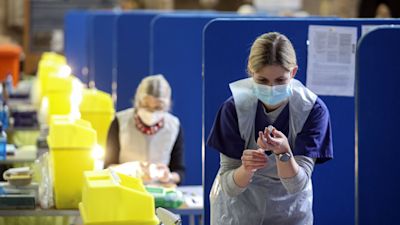Boris Johnson unveils plans to distribute 100 million surplus vaccines

The UK will start donating vaccines to countries in need within weeks, with at least 100 million surplus doses being distributed in the next year, Boris Johnson announced as G7 leaders gathered in Cornwall.
Prime Minister Boris Johnson said: “As a result of the success of the UK’s vaccine programme we are now in a position to share some of our surplus doses with those who need them.
“At the G7 Summit I hope my fellow leaders will make similar pledges so that, together, we can vaccinate the world by the end of next year and build back better from coronavirus”.
The group of seven leading industrialised nations are expected to collectively agree to provide a billion doses of vaccines in an effort to end the pandemic in 2022.
The summit, in Carbis Bay, begins on Friday with leaders of wealthy nations under pressure to do more to share the burden of protecting the world from the virus.
US President Joe Biden has already promised to donate half a billion Pfizer vaccines for 92 low- and lower middle-income countries and the African Union.
Under the Prime Minister’s plan, the UK will provide five million doses by the end of September, with 25 million more by the end of 2021.
Around a fifth of the doses promised by Johnson will be delivered through bilateral arrangements with countries in need while the rest will go through the Covax initiative which is distributing vaccines to poorer nations.
Downing Street said that by sharing five million doses in the coming weeks the UK will meet an immediate demand for vaccines for the countries worst affected by the pandemic without delaying completion of the domestic vaccination programme.
All adults in the UK will have been offered a first vaccine dose by the end of July under Government plans.
Officials hope that vaccinating people around the world will save lives, reduce the spread of the virus and restrict the emergence of new variants which could potentially be more dangerous than existing coronavirus strains.
At the G7 summit, which runs until Sunday, the leaders of the UK, US, Canada, Japan, France, Germany and Italy will pledge at least a billion coronavirus vaccine doses to the world through dose sharing and financing.
They will also set out a plan to expand vaccine manufacturing in order to achieve that goal.
Pledge for 500m Covid vaccines 'is right spirit' but there may be a supply issue
What does the G7 do, which countries belong to it and what's on the 2021 agenda?
The Prime Minister will ask the group to encourage pharmaceutical companies to adopt the Oxford-AstraZeneca model of providing vaccines at cost price for the duration of the pandemic.
Pfizer, Moderna and Johnson & Johnson, also known as Janssen, have already pledged to share 1.3 billion doses on a non-profit basis with developing countries.
The days leading up to the summit have seen Johnson engaged in rows with the European Union and US over Brexit and with his own backbenchers, including predecessor Theresa May, over the cut in the UK’s aid spending.
The UK has gone back on a commitment to spend 0.7% of national income on overseas aid, cutting the amount to 0.5% due to the economic carnage caused by the pandemic.
But the donation of vaccines will count as extra aid spending on top of the £10 billion already promised under the reduced target.
The government is also exploring how to provide vaccines to allow more people to attend the Cop26 climate summit in November which Boris Johnson is hosting in Glasgow.
The UK will work to provide vaccines to accredited delegations who would be unable to get them otherwise in an effort to ensure countries most affected by climate change are able to properly participate in the discussions.
The response to the pandemic is one of the main themes of the summit, which is taking place amid tight security, both against criminal threats but also the risk posed by the virus.
Those attending, including the world leaders, will be tested regularly while the size of delegations and the number of press in attendance will be limited compared with previous summits.
India was invited to participate as a guest country but its delegation will only attend remotely.
Zoe Abrams, executive director at the British Red Cross, said the promise on vaccines was “heartening” but added: “While every commitment must be welcomed, more needs to be done, and fast.
“The G7 states, as world leaders, need to commit to more funding and measures to ensure more vaccines can be produced”.
Listen in for the latest information, advice and analysis on the pandemic - Coronavirus: What you need to know